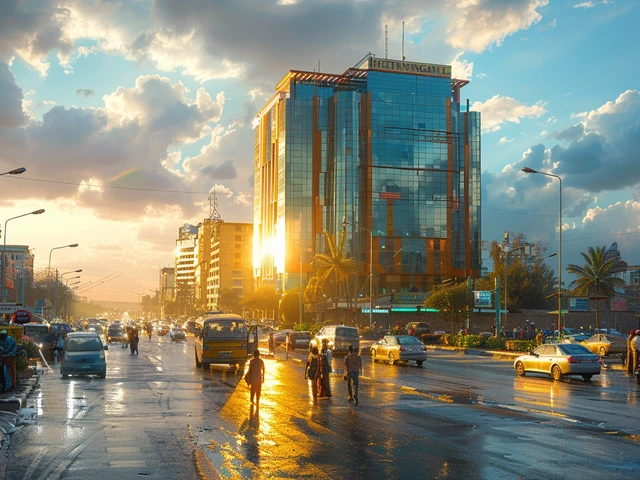Ethiopia, a land of rich culture and history, is also home to some of Africa's wealthiest individuals. Their fortunes span across various industries, contributing significantly to the nation’s economic fabric. Whether in the sectors of agriculture, manufacturing, real estate, or telecommunications, these individuals have leveraged their business acumen to amass considerable wealth and influence.
This long-read article delves into the lives and careers of Ethiopia's most affluent, offering a closer look at how they achieved their status, the industries they control, and the philanthropic efforts they spearhead. By understanding their stories, we can gain insights into the factors driving Ethiopia's economic growth and the challenges these individuals face moving forward.
- Ethiopia’s Economic Landscape and Wealth Distribution
- Prominent Names in Ethiopia’s Wealthiest
- Industry Dominance and Business Ventures
- Philanthropy and Social Contributions
- Challenges and Future Outlook
Ethiopia’s Economic Landscape and Wealth Distribution
Ethiopia is one of the fastest-growing economies in Africa, experiencing substantial growth driven by sectors such as agriculture, construction, and services. The nation's economic landscape is diverse, with the agricultural sector at its core. This traditional mainstay employs about 70% of the population while contributing around 40% to the GDP. However, in recent years, there has been a significant shift towards industrialization and modernization, leading to the rise of manufacturing and infrastructure development.
One of the key factors fueling Ethiopia's economic boom is its strategic location. Situated in the Horn of Africa, the country serves as a gateway for trade and investment on the continent. The government has capitalized on this advantage by implementing pro-business policies and developing industrial parks to attract foreign investors. This has resulted in robust Foreign Direct Investment (FDI) inflows, especially from China, Turkey, and India, propelling sectors such as textiles, garments, and leather products.
Despite the commendable economic performance, wealth distribution in Ethiopia remains highly skewed. A small percentage of the population holds a substantial portion of the nation's wealth, leading to significant income inequality. This disparity is clearly visible in urban areas like Addis Ababa, where luxurious estates and modern skyscrapers contrast with impoverished neighborhoods and informal settlements. Such inequality poses a challenge to sustainable development and social cohesion, necessitating targeted policies to ensure inclusive growth.
The government recognizes these challenges and has initiated several programs to address income inequality. One notable effort is the Agricultural Transformation Agency (ATA), which aims to boost agricultural productivity and improve the livelihoods of farming communities. Similarly, the Productive Safety Net Program (PSNP) provides cash and food transfers to vulnerable households, helping to alleviate poverty and build resilience.
Education and skill development are also crucial components in bridging the wealth gap. Ethiopia's youth population is one of the largest in Africa, and harnessing their potential is key to economic sustainability. Investments in education and vocational training programs are empowering young Ethiopians with the skills needed to thrive in a modern economy. The government, alongside private sector players, is working to create more job opportunities to reduce unemployment and foster equitable wealth distribution.
According to the World Bank, "Ethiopia’s sustained economic growth over the last decade has led to significant poverty reduction, but the benefits of growth have not been evenly distributed."
Looking ahead, the continued development of infrastructure and technological advancements will play a pivotal role in shaping Ethiopia's economic landscape. Projects like the Grand Ethiopian Renaissance Dam (GERD) highlight the country’s ambition to become a major energy exporter, which will have cascading effects on industrialization and economic prosperity.
The resilience and determination of the Ethiopian people, coupled with strategic investments and sound policies, hold the promise of a more inclusive and prosperous future. By addressing wealth distribution challenges, Ethiopia can ensure that the benefits of economic growth are shared by all its citizens, paving the way for a brighter and more equitable society.
Prominent Names in Ethiopia’s Wealthiest
When diving into the list of Ethiopia's wealthiest, one name that often stands out is Mohammed Al-Amoudi. Born to a Saudi father and Ethiopian mother, he is a self-made billionaire with a diverse array of investments across industries such as construction, energy, and hotels. Al-Amoudi's impact on Ethiopia's economy is vast. His company, Midroc Ethiopia, is one of the largest employers in the country, significantly contributing to national employment and development.
The ambitious entrepreneur embarked on his industrial journey in the 1980s, first building a fortune through contracts in Saudi Arabia. His investments in Ethiopia began in the early 1990s, focusing initially on the construction and mining sectors. Today, his conglomerate includes more than 63 companies operating in areas such as agriculture, industry, and tourism. Al-Amoudi's fortune is often quoted to exceed billions, making him one of the wealthiest individuals in Africa.
A prominent female figure among Ethiopia’s wealthy elite is Bethlehem Tilahun Alemu. Founder of SoleRebels, a popular eco-friendly footwear brand, Alemu's rise is inspirational for budding entrepreneurs. Hailing from a marginalized community in Addis Ababa, her vision to combine sustainable practices with traditional Ethiopian shoe-making techniques set her apart in the global marketplace. SoleRebels exports to over 50 countries, demonstrating how Ethiopian talent can resonate worldwide.
Another noteworthy individual is Samuel Tafesse, the real estate mogul behind Sunshine Investment Group, a leading real estate and construction company in Ethiopia. Tafesse's journey from a small contractor to managing multi-million dollar projects underscores the rapid urban development and economic potential of the nation. His portfolio includes luxury residential buildings, hotels, and commercial properties, making significant contributions to Ethiopia’s real estate landscape.
"Investing in real estate in Ethiopia is not just about profitability; it’s about national building," says Samuel Tafesse in an interview with a local business journal.
An influential figure in the media and education sectors is the entrepreneur and philanthropist Mohammed Hussein Ali Al Amoudi. Alongside his immense wealth derived from investments in oil and real estate, Al Amoudi has keenly supported educational initiatives through the Al Amoudi Foundation. The foundation focuses on empowering young Ethiopians with access to quality education, thus fostering the next generation of leaders and innovators.
Finally, one cannot overlook the contributions of Sheik Mohammed Hussein Ali Al-Amoudi, often revered for his charitable deeds and investments that spur economic development. His philanthropic work spans health, education, and social welfare. He funds numerous hospitals and schools, significantly impacting community health and literacy rates in Ethiopia.
| Name | Industry | Net Worth |
|---|---|---|
| Mohammed Al-Amoudi | Diverse (Construction, Energy, Hotels) | Billions |
| Bethlehem Tilahun Alemu | Eco-friendly Footwear | Millions |
| Samuel Tafesse | Real Estate, Construction | Millions |
These prominent figures illuminate the dynamic landscape of Ethiopia's affluent individuals, reflecting a mix of traditional values and modern entrepreneurial spirit. They play a crucial role in shaping Ethiopia’s economy, enriching the nation's socio-economic fabric through their varied contributions and investments. Their stories are not just about wealth accumulation but also about impactful and transformative business practices that inspire many within and beyond Ethiopia.
Industry Dominance and Business Ventures
Ethiopia’s wealthiest individuals have carved their fortunes across a myriad of industries, becoming cornerstones of the nation’s economic landscape. One of the sectors where their dominance is keenly felt is agriculture. As a country where a majority of the population relies on farming for their livelihood, those who manage to upscale and innovate in this sector naturally rise to prominence. A prime example is Mohammed Al-Amoudi, who has made significant investments in agribusiness, enhancing Ethiopia's production and export capabilities.
Another avenue that highlights the prowess of Ethiopian billionaires is the manufacturing sector. For instance, Buzayehu Bizenu, often dubbed “Ethiopia’s industrialist,” has invested heavily in manufacturing and agro-processing industries. Companies under his conglomerate have been pivotal in job creation and boosting local production, which reduces dependence on imports and improves the trade balance.
The real estate market in Ethiopia is another domain largely influenced by the country’s affluent. Notable figures like Samuel Tafesse have built real estate empires that shape the skyline of Ethiopia’s cities. His construction company is responsible for numerous commercial and residential projects, contributing significantly to urban development and providing housing solutions.
Telecommunications is also a key area where Ethiopia’s richest have left their mark. In a country with a fast-growing mobile and internet user base, investing in telecommunications offers high returns. Ethio Telecom, under the guidance of individuals like Frehiwot Tamiru, has undergone rapid transformations to serve millions of subscribers more efficiently. The privatization of the telecom sector attracts substantial local and foreign investments, pushing technological advancements across Ethiopia.
Let’s not forget the banking sector, a field very much influenced by investors aiming to improve financial inclusivity and economic participation. Prominent figures such as Ermias Amelga have been instrumental in founding and advancing numerous financial institutions that cater to Ethiopia’s businesses and individuals. With the recent liberalization measures in financial services, these banks foster the economic participation of a broader populace, thus fueling overall growth.
“Ethiopian business magnates are not only wealth accumulators but also value creators,” says Tewodros Ashenafi, an Ethiopian-American businessman. “Their ventures bring more jobs, better services, and increased innovations.”
In addition to local ventures, Ethiopia’s affluent frequently engage in international business expansions. They diversify their investments by venturing into markets across Africa, Europe, and Asia. These expansions not only fortify their financial standings but also bring global perspectives and expertise back to the home country—greatly benefiting Ethiopia's economic dynamism.
The interplay between these diverse sectors and the business acumen of Ethiopia’s wealthiest provides a solid foundation for the country’s economic growth. From transforming agricultural practices and manufacturing processes, shaping urban landscapes through real estate, advancing technological frontiers in telecommunications, to broadening financial services, these industries collectively form the backbone of Ethiopia's burgeoning economic narrative. Their continued investments and innovations will undoubtedly play a crucial role in shaping Ethiopia’s future economy.
Philanthropy and Social Contributions
One of the most remarkable aspects of Ethiopia's wealthiest individuals is their commitment to giving back to society. Their philanthropy often targets areas critical to the nation’s development, such as education, healthcare, and poverty alleviation. Many have established foundations that play pivotal roles in community upliftment.
For instance, Samuel Tafesse, a prominent real estate mogul, has made substantial donations to educational institutions across Ethiopia. His goal has always been to improve access to quality education for underprivileged children. By providing scholarships and building schools, he aims to cultivate the next generation of leaders. His efforts have positively impacted thousands of lives and have been widely lauded.
Another striking example is the philanthropic work of Mohammed Al-Amoudi, one of Ethiopia’s most famous and affluent personalities. Through his organization, the Sheikh Mohammed Al-Amoudi Foundation, he supports various health and educational projects. The foundation has funded the construction of hospitals and schools in some of the most impoverished regions, ensuring that everyone has access to basic amenities. His contributions don’t stop at the national level; they extend globally, benefitting numerous international humanitarian projects.
"The greatest legacy one can leave behind is not wealth, but impactful and transformative deeds." - Mohammed Al-Amoudi
Among female philanthropists, Bethlehem Tilahun Alemu stands out. As the founder of soleRebels, a footwear company with a social mission, she has not only popularized Ethiopian craftsmanship worldwide but also created hundreds of sustainable jobs. Bethlehem is deeply committed to sustainable business practices and social enterprises, which aim to create economic opportunities while preserving and promoting traditional artisanship.
The contributions of these individuals address immediate needs and promote sustainable development. Their holistic approach ensures long-term benefits by focusing on empowering communities rather than just providing aid. Community-focused initiatives often include vocational training, micro-financing for startups, and infrastructure development, which all aim to foster self-sufficiency and economic growth.
Many wealthy Ethiopians also support cultural and heritage projects, highlighting the importance of preserving Ethiopia’s rich culture. Philanthropic efforts in this area include funding museums, cultural centers, and restoration of historical sites. These initiatives boost tourism and instill a sense of pride and identity among Ethiopians.
Kibrom Ghidey, another significant figure, has invested heavily in healthcare by establishing the first specialized cancer treatment center in Ethiopia. The center offers cutting-edge treatments, significantly improving the quality of care available in the country. It is a lifesaving project reflecting a deep concern for the well-being of his fellow citizens.
The driving force behind these philanthropic ventures is often a profound sense of responsibility and a genuine desire to enact positive change. These wealthy individuals recognize their ability to make a difference and use their resources to tackle pressing social issues. By doing so, they play a crucial role in shaping a more equitable and prosperous future for Ethiopia.
Challenges and Future Outlook
Even with their significant wealth, Ethiopia's elite face numerous challenges that test their resilience and adaptability. One of the most pressing issues is the persistent political instability that occasionally disrupts business operations and hampers long-term planning. Political upheavals can result in uncertainty, making it hard for businesses to flourish without the threat of sudden policy changes or unrest.
Another significant challenge is the infrastructure deficit. While there have been improvements in recent years, the country still struggles with insufficient roads, unreliable electricity, and limited access to clean water in some areas. These infrastructure gaps can increase operational costs and complicate logistics for businesses trying to expand or maintain their efficiency. Addressing these issues is crucial for sustaining economic growth and attracting more investment into the country.
Inflation and currency fluctuation also pose threats to Ethiopia's wealthiest. Managing assets and businesses in an environment where the local currency can be highly volatile requires keen financial strategies. The government has been working on various monetary policies to curb inflation, but the situation remains a challenge for both local and international business owners.
Embracing Technological Advancements
On a positive note, Ethiopia's wealthy individuals are increasingly embracing technology to drive growth and innovation. The digital revolution has not left Ethiopia behind, with many affluent individuals investing in start-ups and tech firms. These investments are vital, as they not only enhance business operations but also introduce innovative solutions to everyday problems faced by the broader population. According to recent reports, the number of tech hubs in Addis Ababa has risen by 20% in the past five years.
These tech-driven solutions, whether in fintech, agritech, or telecommunication, offer promising avenues for growth and present new opportunities for wealth creation. The wealthy have a crucial role in fostering a conducive environment for technological advancements, which can be beneficial for the economy at large. This proactive approach towards technology can mitigate some of the challenges posed by infrastructure deficits and economic volatility.
Social Responsibility and Philanthropy
The importance of social responsibility cannot be overstated. Many of Ethiopia’s wealthiest are heavily involved in philanthropy, contributing to healthcare, education, and social services. Initiatives like building schools, funding healthcare programs, and supporting small businesses are common among the affluent. These efforts are not only altruistic but also essential for stable and sustainable economic growth.
„Giving back to the community is not just a duty but an imperative for sustainable development,” stated by one of Ethiopia's notable philanthropists, underscores the critical role of social contributions in shaping the future.
Indeed, their philanthropic activities help bridge the socio-economic divide, fostering goodwill and enhancing their reputations. By investing in the community, they play a part in creating a more equitable society, which ultimately benefits everyone. As these individuals continue to grow their wealth, their commitment to social responsibility sets a positive precedent for others to follow.
The future holds a mix of challenges and opportunities for Ethiopia’s wealthiest. Their ability to navigate political instability, infrastructure deficits, and economic fluctuations while embracing technological advancements and committing to social responsibility will define their legacies. As the nation progresses, these affluent individuals have the potential to drive significant positive change, cementing their roles as both economic and social leaders.

 Top Countries for Foreign Entrepreneurs to Start a Business
Top Countries for Foreign Entrepreneurs to Start a Business
 Is English Commonly Spoken in Ethiopia?
Is English Commonly Spoken in Ethiopia?
 Exploring Tinder's Role in Ethiopia: Opportunities and Challenges
Exploring Tinder's Role in Ethiopia: Opportunities and Challenges
 Navigating Business Risks in Ethiopia: Opportunities and Challenges
Navigating Business Risks in Ethiopia: Opportunities and Challenges
 Profitable Banks in Ethiopia: A Deep Dive into Financial Success
Profitable Banks in Ethiopia: A Deep Dive into Financial Success
ashli john
July 6, 2024 AT 18:23Great read you really shed light on the diverse ways Ethiopia’s top earners are shaping the economy and giving back to the community
Kim Chase
July 6, 2024 AT 18:31its cool to see how they mix business with philanthropy
David Werner
July 6, 2024 AT 18:40While most are busy counting cash, the shadow networks pulling the strings are nowhere near as transparent – think about the hidden equity deals and offshore accounts that never see the light of day. It feels like every headline about Ethiopian riches is a carefully curated cover story for a deeper, more covert power play that the mainstream media refuses to expose.
Paul KEIL
July 6, 2024 AT 18:48The narrative you present lacks critical analysis; the macro‑economic indicators suggest a concentration risk that is glossed over, and the discourse fails to address the systemic governance gaps that enable wealth accumulation without accountability.
Horace Wormely
July 6, 2024 AT 18:56The article is well‑structured, but several sections would benefit from tighter sourcing and avoidance of colloquial expressions that may confuse a scholarly audience.
christine mae cotejo
July 6, 2024 AT 19:06Reading through this piece feels like embarking on a comprehensive tour of Ethiopia’s socioeconomic evolution, where each paragraph unfurls a new layer of insight. The opening sections deftly outline the nation’s rapid GDP growth, anchoring the discussion in concrete agricultural statistics that set the stage for understanding wealth creation. From there, the narrative pivots to the rise of industrial parks, a development that has catalyzed foreign direct investment and diversified the economic base beyond its traditional agrarian roots. The author’s inclusion of specific case studies-such as the transformative impact of the Grand Ethiopian Renaissance Dam-adds tangible context that grounds abstract economic theory in real‑world outcomes. Moreover, the profiles of individual titans like Mohammed Al‑Amoudi and Bethlehem Tilahun Alemu illuminate how personal entrepreneurship intersects with national policy, illustrating a symbiotic relationship between private ambition and public infrastructure. The discussion on philanthropy is particularly compelling; it underscores how wealth redistribution through foundations can address systemic inequities while simultaneously enhancing the social capital of the benefactors. The section on challenges-political instability, infrastructure deficits, and currency volatility-provides a balanced view, acknowledging that despite impressive growth, significant hurdles remain. The author also highlights the burgeoning tech ecosystem in Addis Ababa, noting a 20 % rise in startup incubators, which signals a shift toward knowledge‑based industries. This forward‑looking perspective is essential for readers seeking to understand future trajectories rather than just past achievements. Throughout the article, the use of statistical data is judicious, avoiding overwhelm while still reinforcing credibility. The concluding remarks synthesize the myriad threads, emphasizing that the legacy of Ethiopia’s wealthiest will be judged not only by their accumulated assets but also by the durability of the institutions they help build. In sum, the piece offers a nuanced, well‑researched, and engaging overview of wealth dynamics in a rapidly changing Ethiopian landscape.
Douglas Gnesda
July 6, 2024 AT 19:16From a financial engineering standpoint, the diversification strategies employed by these magnates-spanning agribusiness, telecom, and renewable energy-are textbook examples of risk mitigation while capitalizing on emerging market growth vectors.
Abhijit Pimpale
July 6, 2024 AT 19:26Data suggests that the concentration of wealth remains top‑heavy, with the top‑0.1 % controlling over 60 % of private assets.
Eric DE FONDAUMIERE
July 6, 2024 AT 19:36Love the deep dive! The only thing I’d add is maybe a typo in the word ‘entreprenuer’ but overall great job.
Pauline Herrin
July 6, 2024 AT 19:46While the article is comprehensive, a more rigorous citation of the World Bank figures would elevate its scholarly merit.
pradeep kumar
July 6, 2024 AT 19:56The piece is solid but could benefit from a clearer distinction between public and private sector contributions.
love monster
July 6, 2024 AT 20:06Really appreciate the balanced tone-it's refreshing to see both achievements and challenges laid out without bias.
Christian Barthelt
July 6, 2024 AT 20:16All praise, no criticism? Seems like the author is overlooking the opaque corporate structures that enable tax avoidance.
Ify Okocha
July 6, 2024 AT 20:26The analysis is shallow; the author fails to interrogate the systemic corruption that underpins many of these fortunes.
William Anderson
July 6, 2024 AT 20:36Another glorified tribute to the rich-hardly any real insight, just a glossy PR piece.
Sherri Gassaway
July 6, 2024 AT 20:46One might ponder whether wealth, in its sheer magnitude, serves as a modern mythos reflecting societal aspirations and existential anxieties.
Milo Cado
July 6, 2024 AT 20:56Excellent summary! 👍👏 Looking forward to more deep‑dives into Ethiopian economics.
MONA RAMIDI
July 6, 2024 AT 21:06Honestly, the whole thing feels like a buzzword parade-nothing groundbreaking.
grace riehman
July 6, 2024 AT 21:16Thanks for including the cultural angles; it’s vital to see how traditions weave into modern business practices.
Vinay Upadhyay
July 6, 2024 AT 21:26Oh sure, because throwing a few charity numbers at the end magically fixes all the structural flaws-how charming.